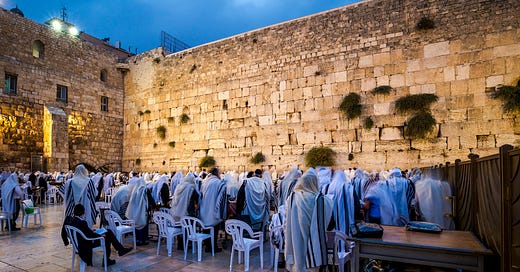I used to dread Yom Kippur.
As the Day of Judgment approached, I thought the best thing about it was that it would soon be over and at least the next Yom Kippur was a full year away. That’s changed a lot over the years, but my Yom Kippur memories are as vivid as they are evolving.
I have always loved the communal singing of the Kol Nidre services, and as a kid, I was amazed to see our small-town shul, where my Dad was the rabbi, miraculously filled to capacity like no other time of the year. But the service seemed endless, and by the time I got home, with about 21 hours of fasting still to go, I was dry of mouth and incredibly thirsty. Fasting the full 25 hours, I concluded, was simply impossible.
That changed when I was about 12, and our family hosted a guest cantor (for an auxiliary service) who arrived so late, just before the fast began, that he had no time to eat dinner and had hardly eaten that day. The fact that he seemed to hold up just fine throughout the fast amazed me, and I’m still reminded of that when the duration of the fast starts to get to me.
There were less than a handful of Orthodox families in Annapolis, Maryland, a town small enough that when I’d walk down Main Street, people sometimes recognized me as “the Jewish rabbi’s son” (as opposed to?...). Aside from the fasting, Yom Kippur was tough for me because as an avid baseball fan, I was frustrated that the holiest day of the year invariably fell out during the World Series, leaving me in the dark. (I was convinced that each year Ford Frick, the austere commissioner of baseball at the time, would consult a luach, or Jewish calendar, and schedule the World Series, davka, during the High Holy Days.)
But Yom Kippur had its moments. One year, when I was in my early teens, my friend Michael (whose father was the cantor) and I came up with an entertaining but short-lived diversion during the long day of services. We chose an arbitrary spot in the service and stood up from our front-row seats. A moment later, there was a rustling and stirring behind us as gradually the entire congregation of several hundred rose, following our lead.
As soon as everyone was up, we sat down. They did the same.
This mischievous act was repeated a few minutes later, then again, until my father, seated facing us on the bima in his white robe, directed a slight shake of his head in our direction, though with the hint of a smile on his lips.
Reluctantly, we stopped, not realizing we probably had just invented “the wave.”
As I grew older, the meaning of the words of the Yom Kippur liturgy began to resonate for me. I came to recognize the day not as a burden but a gift – an opportunity to connect with God, and with myself, reflecting on my faults and resolving to change my ways.
I remember watching my maternal grandfather, a soft-spoken and pious rabbi who studied Talmud day and night, uncharacteristically emotional when praying for forgiveness. I was deeply moved by his devotion, yet had a sinking feeling within. If a rabbi leading an exemplary life of dedication to mitzvot was so fearful of his fate, what does that say about me? I felt doomed.
Over the years I have come to appreciate the majesty, depth and wisdom of Yom Kippur, a solemn day when we confront our mortality and the fragility of life itself. But also a day whose prayers climax with faith in our future: “May we be sealed in the Book of Life.”
In our 21st century society, the unforgiving Internet stores our past misbehaviors and misstatements forever, for all to see. In Judaism, though, we are offered a path to forgiveness – Teshuvah, Tefillah, Tzedakah – where sincere repentance, prayer and charitable acts can wipe away our sins and give us a clean slate going forward. What a powerful spiritual and psychological gift we are granted, or give ourselves.
Yom Kippur observed with fellow congregants has become a time to focus on the soul rather than the body; we learn more about ourselves as we pray for others.
That’s one of the inspiring qualities of this holy day: the more we strive heavenward, the more we come to appreciate the world and the people around us. Every day is a blessing, every person in our lives is a potential friend, each of us is flawed, and we are bound by our impermanence.
In the end, Judgment Day is not a sad day. The Talmud says it is one of the happiest because even as we look back on our yesterdays, Yom Kippur holds the promise of tomorrows.
May this Yom Kippur bring us closer to peace, and to each other.
Note: An earlier version of this essay was published in The Jewish Week, Oct. 3, 2003.





Fantastic! Funny!
Poignant and funny. Keep 'em coming.
Bernie